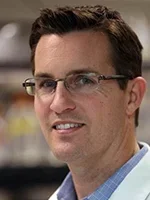Lethal Energetic Stress
Understanding How to Stop Growth
Discoveries for revolutionary thinking
As posited by the Warburg effect, tumors often use glucose in much greater quantities than normal cells. Positron emission tomography (PET) imaging highlights those cells and tissues that guzzle the fuel. This powerful technology is widely available for both clinical care and research at UCLA.
David Shackelford, PhD, uses PET imaging to understand, in real time, how cancer hijacks metabolism. Shackelford, an assistant professor of pulmonary and critical care medicine, wants to know how certain drugs affect the glucose consumption scan, done in humanized lung cells in mice.

Stressing cancer cells with phenformin
The drug phenformin is a chemical cousin to the diabetes drug metformin, used by more than 120 million people worldwide. Phenformin is 50 times stronger than metformin. Doctors withdrew phenformin from clinical use in the 1970s because some patients experienced a buildup in lactic acid.
Shackelford and his team found that phenformin induced what he calls “lethal energetic stress” in lung cancer cells by poisoning the machinery in the cancer cells that generates energy.
The drug worked by hijacking normal processes within the cell. In normal cell function:
- Exercising depletes stores of ATP, the cell’s fuel.
- In response, cells activate pathways that sense energy stress.
- Cells begin to shut down active growth to free up energy.
Tumors, however, don’t have the ability to control their growth in this way. Instead, they grow too fast, overstress themselves and die. “As cancer advances, the cells lose their braking mechanism,” Shackelford says.
Having found this tantalizing Achilles heel, Shackelford and his team started to examine the way cancer metabolizes other nutrients. Now, they are continuing to seek ways to take advantage of the crash caused by brake failure.
This phenomenon is similar to what Thomas Graeber, PhD, describes, but in this case, a drug causes it. Read more about Graeber’s work with metabolism and biochemical signaling.
Withholding nutrients to test cancer cell metabolism
Using PET and novel biomarkers, the researchers examined the effect of withholding nutrients from tumors. While most researchers do studies like this using pulverized tissue, the UCLA team uses non-invasive PET scans to see the effect of different therapies in real time.
They tested metabolic pathways one by one. Without glucose, many tumors could not grow, but some could.
The group then looked at cancer’s use of glutamine, an essential amino acid that is part of the cell’s food supply. They found that a subset of very aggressive lung tumors switch from using glucose to using glutamine and other amino acids for growth.
Stressing tumors to discover new therapies
As this work develops, researchers are finding new ways to study tumor changes.
Ultimately, doctors won't have to wait for months to see if therapies work, as they do now. Instead, doctors will be able to treat tumors metabolically.
In the future, doctors may adopt these findings for clinical care. In that process, physicians could:
- Test tumors in a cancer patient for their use of glucose
- Choose a targeted therapy
- Scan the tumors for their preferred amino acid
- Choose another therapy if needed
- Continue scanning and testing, as needed, through the list of nutrients and associated therapies that induce energetic stress
Continuing investigations into cancer metabolism
This new era continues with additional investigations into:
- Slowing glucose metabolism: Researchers are currently conducting phase 1 and 2 clinical trials of a compoundat slows glucose metabolism. Heather Christofk, PhD, played a major role in designing the compound. These studies are being held outside of UCLA, with the help of a company that Christofk helped start.
- Targeting amino acids: Other researchers are testing a molecule that Schackelford investigated that targets use of amino acids for fuel in lung, kidney and triple negative breast cancers.
“If tumors adapt to a new fuel, we turn on the tap and stress them. We can assess tumor changes quickly and provide new therapies quickly.”